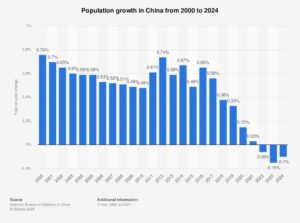China’s Population Declines for Third Consecutive Year
China’s population reportedly declined for the third consecutive year in 2024, marking a continuation of a downward trend after over sixty years of growth. This decline is attributed to an increasingly ageing population and persistently low birth rates.
Once the most populous nation globally, China was surpassed by India in 2023. In response to falling birth rates, the Chinese government has been promoting pro-fertility initiatives and offering subsidies.
According to the National Bureau of Statistics, the population was recorded at 1.408 billion at the end of the year, a decrease from 1.410 billion in 2023. The drop was less severe than in the previous year, which saw a decline more than double that of 2022.
China ended its strict “one-child policy” implemented in the 1980s due to concerns about overpopulation, allowing couples to have three children starting in 2021. However, these measures have not reversed the demographic decline in a nation that has long depended on its large workforce for economic growth.

Experts suggest that the decreasing birth rates are largely driven by rising living costs and an increasing number of women pursuing higher education and joining the workforce. The trend of population decline is expected to persist, as young people face uncertain economic prospects and women encounter entrenched gender discrimination in the labour market, according to Yun Zhou, a sociologist at the University of Michigan.
The data released on Friday indicated that individuals aged 60 and overreached 310.31 million, accounting for nearly a quarter of the population and rising from approximately 297 million in 2023.
Despite the birth rate being one of the lowest worldwide, there was a slight increase to 6.77 births per 1,000 people compared to the previous year. Zhao Litao, a senior research fellow at the National University of Singapore’s East Asian Institute, warned that this increase is unlikely to be sustained, as the number of women of childbearing age is projected to decline significantly in the coming decades.
See Also: Court to Hear N12.3bn Fraud Case Against Otudeko
Independent demographer He Yafu attributed the recent uptick in births to women who postponed having children during the COVID-19 pandemic and noted an increase in marriages during 2023 and 2024, the auspicious Year of the Dragon. However, he emphasized that the overall trend of population decline is unlikely to change without robust policies to encourage childbirth.
In September, officials announced plans to gradually raise the statutory retirement age, which has been set at 60—one of the lowest in the world and unchanged for decades. These changes are effective as of January 1.
China’s economy, now the second largest in the world, faces challenges of slowing growth, compounded by a rapidly ageing population and declining birth rates, which are placing significant strain on pension and public health systems.
Content Credit| Kemi Arowolo
Picture Credit | https://www.statista.com/




